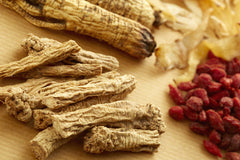How to Prevent Hemorrhoids From Getting Worse - Hemorrhoid Prevention Tips and Tricks
Posted on 14 March 2018 by Maryanne Johnson
Share this post
Discover how to prevent hemorrhoids with simple and easy steps. If you are a chronic hemorrhoid sufferer and are looking to prevent hemorrhoid flare-ups, then you've come to the right place.
One of the things on many people's minds, though they may not admit, is, "what causes hemorrhoids"?
Hemorrhoids are a common ailment and though not typically dangerous, they can be a big pain in the back side, literally.
The pain and agony from hemorrhoids can often be unbearable.
Also known as piles, hemorrhoids are swollen veins that occur in the lower rectal area.
Typically, they are formed from too much straining during a bowel movement.
While it is uncommon for blood clots to form, hemorrhoids can be quite a bothersome condition.
There are four different types of hemorrhoids.
Today, we will be discussing some of the signs and symptoms of hemorrhoids and how to prevent them.
You are gonna be much happier if you can stop yourself from getting hemorrhoids. So, we'll share some secrets and tips that will help you avoid hemorrhoids for good.
Some of the signs or symtpoms of hemorrhoids include itching, swelling, pain, and a lump near the anus.
You may also see a certain amount of red blood present either in the toilet or on the toilet paper after using the bathroom. This usually more common in the case of internal hemorrhoids.
The list of symptoms can vary from person to person and also depend upon the type of hemorrhoid that they have.
External Hemorrhoids:
This kind of hemorrhoid is located outside the anus. It usually feels painful with itchiness, burning and irritation common symptoms.
Internal hemorrhoid:
This type of hemorrhoid is not typically associated with discomfort. Bleeding can occur with internal hemorrhoids if excessive straining is done.
Prolapsed/Protruding hemorrhoid:
These occur when internal hemorrhoids are pushed through the anal opening. External hemorrhoids are on the skin surrounding the anus.
Thrombosed hemorrhoids:
This type of hemorrhoid happens when blood starts pooling in an external hemorrhoid and forms a clot.
What is Causing Your Hemorrhoids?
The two things that typically cause hemorrhoids are dehydration or a lack of water and constipation.
When you are facing either one of these states your stool can stiffen up and cause more straining when you have a bowel movement.
Lack of fiber can also have a similar effect because the stool becomes hard, malformed, and is not easy to pass, which leads to straining and pressure.
Over straining and pushing hard to pass a bowel movement are common causes of hemorrhoids.
Many pregnant women, especially if obesity is thrown into the mix, are afflicted with hemorrhoids.
This is due to the extra amount of pressure that is applied to the lower body.
Aging tends to be another factor, because as we get older the tissues that support the veins in the rectal area will stretch and become weaker.
How to Prevent Hemorrhoids During Pregnancy
There are a few things that you can do to try to prevent hemorrhoids while you’re pregnant.
Hemorrhoids in pregnancy are normally caused by increased pressure in the perineum and anal area.
Standing may cause an increase in pressure in these areas, so it can contribute to the problem. Try not to stand for too long. but there are a list of things other than that, that you can do to try to prevent hemorrhoids.
If you’re pregnant try to doing some of the following:
- Be aware of what foods are bad for you and should be avoided
- Consume a high-fiber diet
- Eat plenty of vegetables and fruit
- Do not delay going to the bathroom
- Drink the appropriate amount of fluids
- Drink prune juice if cleared by your doctor
A list of foods you can avoid to prevent hemorrhoids are as follows:
- Spicy foods
- Processed meat
- Red meat
- Caffeine
- Refined carbohydrates
- Fried food
- Citrus fruit
- Alcohol
- Excessive fiber white breads and bagels
- Dairy products
If you follow these two lists, you can at least minimize the threat of getting hemorrhoids.
Pregnant woman usually do not experience hemorrhoids until the third trimester of pregnancy.
Let’s face it, the third trimester is an uncomfortable time for most pregnant women and the last thing you want to do is make it worse by getting hemorrhoids.
How To Treat Hemorrhoid Flare Ups
If you do get hemorrhoids, there are a few things that they can do to keep them from getting worse.
- You can put ice on them or use a hemorrhoid ice pack
- A painkiller may be appropriate if okayed by your doctor
- Never scratch as this can inflame them big time
- Make sure that you choose cotton or soft and looser underwear if possible
- Apply witch-hazel along side a hemorrhoid cream or using an over-the-counter wipe with witch hazel to soothe the pain and itch with
- Fill your tub with a few inches of warm water and soak there for about 15-20 minutes at a time.
These recommendations tend to help greatly when used in combination.
How to Prevent Bleeding Hemorrhoids?
Anytime you have bleeding, feel a lump or experience severe pain, it is important that you seek the opinion of a doctor.
Hemorrhoids are not the only condition that can cause these symptoms, so please don’t self-diagnose.
Some potential conditions with these symptoms can be serious, but treatable.
A Doctor May Be Required For Hemorrhoid Treatment
If you have hemorrhoids, there are types of hemorrhoids that will warrant a doctor's opinion.
A severe case of thrombosed hemorrhoids or prolapsed hemorrhoids often need medical treatment to get better. Rubber Band Ligation and Sclerotherapy are two common procedures for hemorrhoids.
Hemorrhoid surgeries are relatively common in the US.
If your condition is not improving, you may have other issues.
Sometimes hemorrhoids can get infected or strangled.
A doctor will be able to assess this and determine if surgery or outpatient treatment is necessary.
Be wise, seek treatment when needed and protect your health.





0 comments